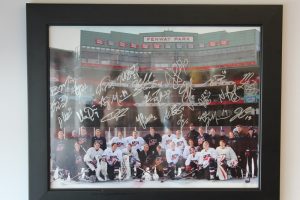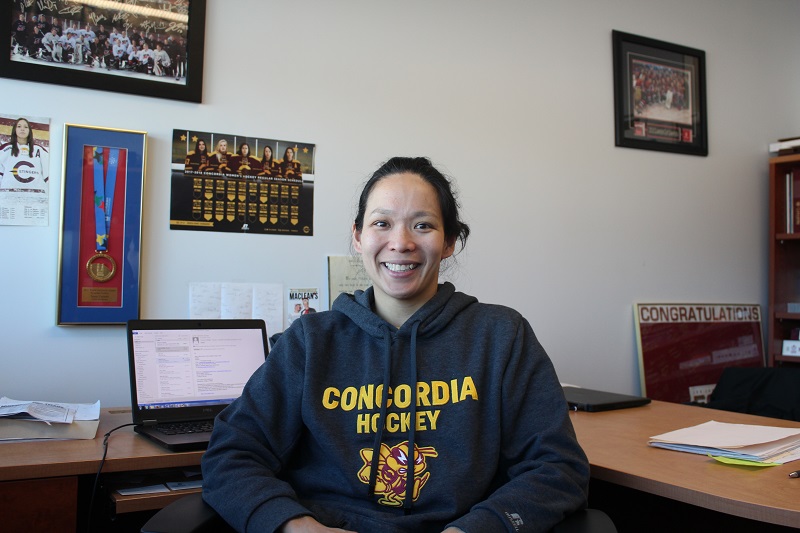The four-time Olympian once saw the Games as an “untouchable dream”
During the opening ceremony of the 2002 Winter Olympic Games in Salt Lake City, Utah, Julie Chu and the rest of the American athletes waited for their turn in the Parade of Nations.
As host country, the United States was the last country in the parade, so Chu—who was 19 years old and competing in her first Olympics for the women’s hockey team—had to wait a while. However, as the athletes lined up outside the Rice-Eccles Olympic Stadium where the opening ceremony took place, she could hear the cheers coming from inside.
“There was a moment where you heard [the stadium] absolutely erupt, and we all knew for sure that Greece had just walked in,” Chu said. Greece leads the parade because of the Olympics’ origins in the country. “I think about it now, and I get goosebumps.”

Eventually, the American team made their way into the stadium. “Finally, you [enter] and it just opens up,” Chu said. “It’s just bright lights and cheering, and you think, ‘This is pretty cool.’”
Salt Lake City was the first of four Olympic Games for Chu, who is now the head coach of the Concordia Stingers women’s hockey team. She is one of three players to have participated in four Olympics for the American women’s team, winning three silver medals and a bronze medal in 2006. Only seven other players have four or more Olympic medals in women’s hockey, including Canadian Caroline Ouellette—the Stingers’ assistant coach—who has four gold medals.
Although Chu watched the Olympics growing up, she said competing in them seemed like an “untouchable dream,” until women’s hockey was included in the 1998 Olympics in Nagano, Japan.
“When women’s hockey was announced as an Olympic sport, it was the first time I had a dream of going to the Olympics,” Chu said. “I wanted to make that Olympic team one day. I don’t know if I had set a goal; 1998 wasn’t on my radar because I was only 15. I probably had visions of 2002, but I didn’t have a time frame. It was more that I wanted to chase after this dream, and hopefully, one day be able to reach it.”
Chu watched on TV as the American team won the inaugural women’s hockey tournament at the 1998 Olympics. While she was watching the Games, her father, Wah, told her, “If you ever make it to the Olympic Games, I’m going to get the Olympic rings [tattooed] on my arm.” Chu said her father is traditional and was against tattoos, so she was shocked when he said that.
Neither Chu nor her father mentioned the tattoo until four years later, when she made Team U.S.A. Just prior to the Olympic Games, Wah followed through on his promise, and then Chu’s mother, brother and sister all said they would get a tattoo of the Olympic rings and her number, 13.
“They told me beforehand that they would get it before the Olympics,” Chu said. “I told them, ‘I don’t want to know, because until I [play], I’m not an Olympian.’” After the Games, Chu also got the Olympic rings tattooed to match the rest of her family.
Through four Olympics, Chu experienced the Games in different corners of the world. She admits that, prior to the 2002 Olympics in the United States, she had hoped to play in a country she had never visited, so she could travel. But Chu quickly realized how special it was to play at home.
“I was young, so getting into it I realized how awesome it really was,” she said. “Playing in Salt Lake City, I had over 30 friends and family [members] come and be a part of the Olympic Games.”
Chu got to travel to Turin, Italy, in 2006, then visit her neighbouring country in Vancouver in 2010, and say goodbye to the Olympics in Sochi, Russia, in 2014. Chu said she experienced a bit of the Italian culture at her second Olympics, but didn’t get to be immersed in the Russian culture at her last Olympics. She said the Olympic village in Turin was in the city, whereas in Sochi, it was an isolated town on its own.
Nonetheless, Chu got to meet athletes from different nations in the dining hall at all four Olympics. Even though each country had its own dorm building in the Olympic village, the dining hall was communal, so Olympians from every sport and country ate together.
“The dining hall is probably the best melting pot of all the nations,” Chu said. “There have been times when we’ve sat down and have had meals with people from different nations […] You’re having a conversation, and get a chance to hear about their journey or about their experience at that Olympic Games.” Chu added that, for the most part, Olympians are fun to be around.
“I’ve met some really amazing people along the way,” she said. “[They] have been on the biggest stage, but at the end of it, they’re hard-working and just chasing their dream and are proud to represent [their country.]”
This year’s Olympics, held in Pyeongchang, South Korea, will be the first in 20 years that Chu won’t compete in. Even though she said not playing for the national team is hard at times, she’s still excited to watch this year’s Games.
“Sometimes we blink and [Sochi 2014] didn’t seem that long ago,” Chu said. “What I tell [my former teammates] is to enjoy the moment, because it goes fast. Let go of the things you can’t control, let go of the external stuff and focus on the moment.”
Main photo by Alex Hutchins.




